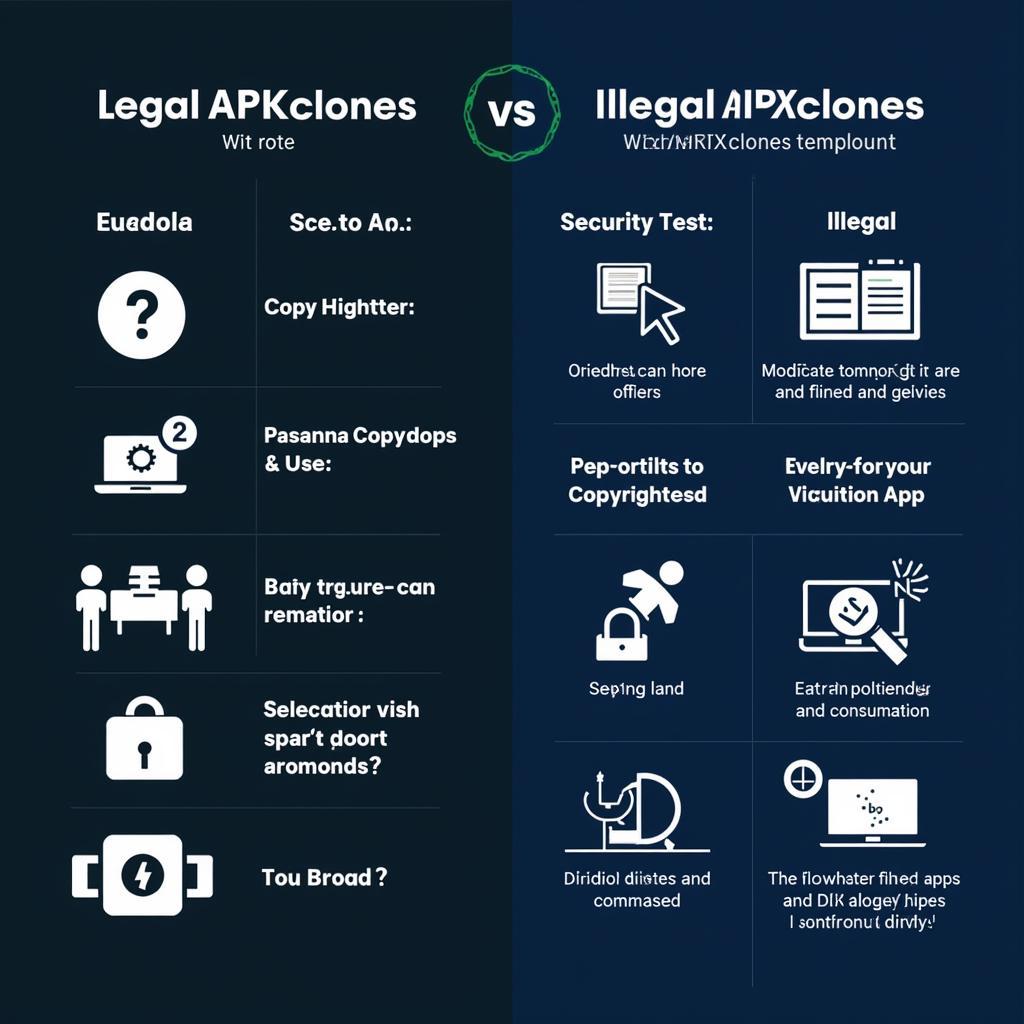APK cloning, the process of duplicating an Android application package (APK) file, has garnered significant attention in recent years. This guide dives deep into the intricacies of APK cloning, exploring its various aspects, benefits, risks, and ethical considerations. We’ll also provide practical insights and address common questions surrounding this often-misunderstood practice.
Understanding APK Cloning
APK cloning involves creating a functionally identical copy of an existing APK file. This doesn’t necessarily mean simply copying the file; it often involves decompiling the original APK, modifying its code (or resources), and then recompiling it into a new APK. The resulting application will have the same functionality as the original, but may have different branding, features, or even malicious code injected.
Why Clone APKs?
There are several reasons why developers or individuals might choose to clone an APK. These include:
- App Modification: Cloning allows developers to customize existing apps to their liking. This could involve adding new features, removing unwanted functionalities, or changing the app’s appearance.
- Security Testing: Security researchers often clone APKs to analyze their code for vulnerabilities. By modifying the app and testing its behavior, they can identify potential security flaws.
- Backup and Preservation: Cloning can serve as a backup mechanism for preserving apps that might be removed from app stores or become unavailable.
- Learning and Education: For aspiring Android developers, cloning APKs can be a valuable learning experience. It allows them to examine the inner workings of existing apps and understand how they are built.
 APK Cloning Process Explained
APK Cloning Process Explained
The Risks and Ethical Considerations
While APK cloning can be beneficial, it’s crucial to be aware of the associated risks and ethical implications:
- Copyright Infringement: Cloning copyrighted apps without permission is illegal and unethical. It violates the intellectual property rights of the original developers.
- Security Risks: Cloned apps can be modified to include malware or spyware, posing a significant security threat to users.
- Malicious Intent: Cloned apps can be used for malicious purposes, such as spreading misinformation, stealing user data, or carrying out phishing attacks.
Is APK Cloning Legal?
The legality of APK cloning depends entirely on the context and the specific actions taken. Cloning an app for personal use or educational purposes, without distributing the cloned version, is generally acceptable. However, distributing cloned versions of copyrighted apps without permission is illegal in most jurisdictions.
 Legal and Illegal APK Cloning Examples
Legal and Illegal APK Cloning Examples
Tools and Techniques for APK Cloning
Several tools and techniques can be used for APK cloning. These include:
- APK Decompilers: These tools allow you to extract the source code and resources from an APK file.
- APK Editors: These tools enable you to modify the APK’s resources, such as images, text, and layout files.
- Android Studio: Android’s official IDE can be used to decompile, modify, and recompile APKs.
How to Protect Your App from Cloning
Developers can take several steps to protect their apps from unauthorized cloning:
- Code Obfuscation: This technique makes the app’s code more difficult to understand, making reverse engineering more challenging.
- Encryption: Encrypting sensitive data within the app can protect it from being accessed by unauthorized individuals.
- Security Checks: Implementing security checks within the app can detect if it has been tampered with or cloned.
Conclusion
APK cloning is a powerful technique with both legitimate and illegitimate applications. Understanding its various aspects, benefits, and risks is crucial for both developers and users. By adhering to ethical practices and respecting intellectual property rights, we can ensure that APK cloning is used responsibly and for the benefit of the Android ecosystem. Remember, responsible cloning promotes innovation while protecting the rights of developers.
FAQ
-
What is APK cloning?
APK cloning is the process of creating a duplicate of an Android application package (APK) file. -
Is APK cloning legal?
The legality depends on the context. Cloning for personal use or education is generally acceptable, but distributing cloned copies of copyrighted apps without permission is illegal. -
What are the risks of using cloned apps?
Cloned apps may contain malware or spyware, posing security risks. -
How can developers protect their apps from cloning?
Developers can use code obfuscation, encryption, and security checks to protect their apps. -
What are some legitimate uses of APK cloning?
Legitimate uses include app modification, security testing, and learning purposes. -
Can I clone an app to add new features?
Yes, cloning allows for app modification, including adding new features. -
Where can I find tools for APK cloning?
Several APK decompilers and editors are available online.
For further assistance, please contact us: Phone: 0977693168, Email: [email protected] or visit our address: 219 Đồng Đăng, Việt Hưng, Hạ Long, Quảng Ninh 200000, Việt Nam. We have a 24/7 customer support team.